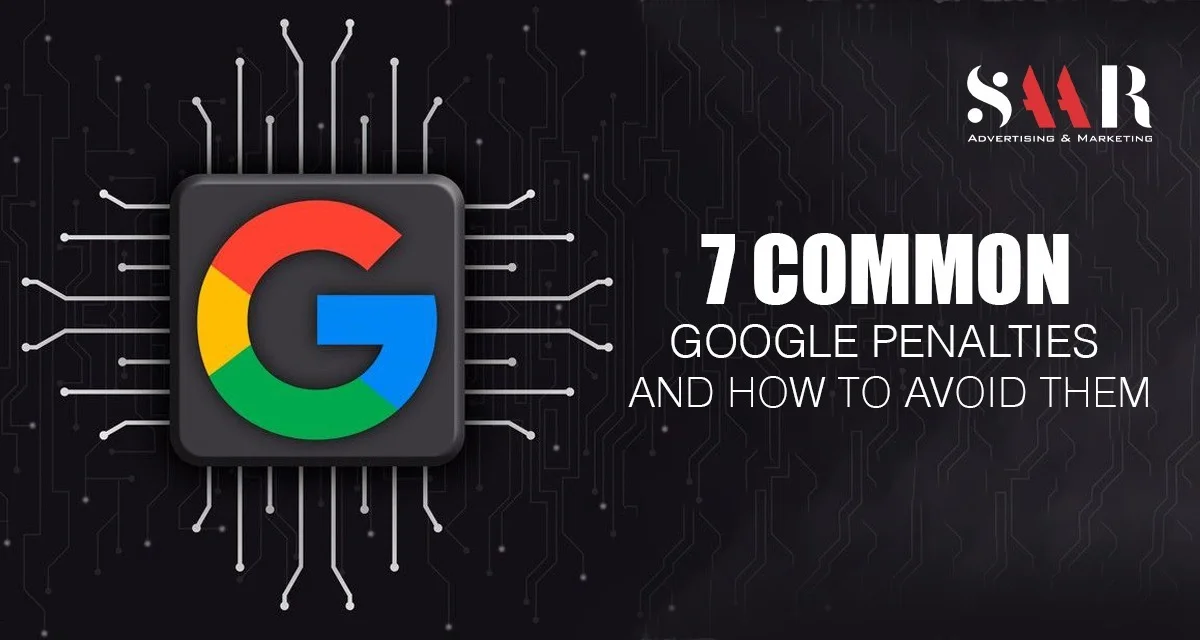
Getting a penalty is never a good thing—whether it’s in sports or on the internet. For websites, a Google penalty can be particularly harmful as it impacts your website’s visibility in search results.
Google penalties occur when the search engine detects that a website has violated its guidelines, either through manipulative SEO tactics or low-quality content. When penalized, your site can lose its rankings or even disappear from search results, costing you traffic, potential customers & revenue.
As a result, understanding the different types of Google penalties & how to avoid them is crucial for maintaining a strong online presence. With that being said, let's look at seven common types of Google penalties & how to avoid them.
What is a Google Penalty?
A Google penalty is a punishment that Google gives to websites that use unethical or black-hat SEO techniques. When penalized, your website may see a drop in rankings or even be removed from search results altogether.
Penalties can be manual, where a Google team member reviews & flags your site, or algorithmic, where Google’s algorithm automatically detects & penalizes your website.
7 Common Google Penalties
1. Keyword Stuffing
Keyword stuffing happens when a webpage is overloaded with keywords in an attempt to rank higher on Google. This is an outdated & ineffective SEO strategy that Google can easily detect. Instead of boosting rankings, keyword stuffing often results in a Google SEO penalty.
How to Avoid It:
- Use keywords naturally within your content.
- Focus on long-tail keywords that are more specific & relevant to your audience.
- Ensure your content reads well & provides real value to readers rather than just repeating keywords.
2. Cloaking
Cloaking involves showing different content to users & search engines, which is against Google’s guidelines. For example, a website might show one version of a webpage to a human visitor & a completely different version to a search engine crawler.
How to Avoid It:
- Ensure that the content you present to search engines is the same as what you show to users.
- Avoid sneaky redirects & deceptive practices.
- If you’ve used cloaking techniques in the past, remove them & use Google Search Console to request a review.
3. Hacked Content or Website
If your website is hacked, it may start showing spammy or malicious content, leading to a Google penalty. A hacked website poses a risk to users & Google wants to protect them from such threats..
How to Avoid It:
- Regularly check your website for security issues.
- Use tools like malware scanners, keep your software & plugins updated & add two-factor authentication for better security.
- If your site gets hacked, use Google’s guide to clean it up & request a review through Google Search Console.
4. Thin Content
Thin content refers to pages with little to no value, often created just to rank on search engines. Google penalizes sites with low-quality or automatically generated content that lacks depth & relevance.
How to Avoid It:
- Focus on creating high-quality, valuable content that answers users’ questions.
- Use white-hat SEO practices like thorough keyword research & writing comprehensive articles.
- Make sure your content adds real value to the reader.
5. Doorway Pages
Doorway pages are low-quality pages created to rank for specific keywords & then redirect users to different pages. These pages don’t provide any real value to users & are considered deceptive.
How to Avoid It:
- Remove any doorway pages from your site & ensure your pages provide valuable content.
- Focus on building high-quality landing pages that genuinely serve the user's intent.
6. Unnatural or Low-Quality Inbound Links
Building backlinks is a great way to boost your website’s authority, but they need to come from reputable sites. Links from spammy or irrelevant sites can lead to a Google penalty. This is part of Google’s effort to prevent manipulation of its search results.
How to Avoid It:
- Use only ethical link-building strategies, like guest posting on reputable websites & earning links naturally.
- Avoid sneaky redirects & deceptive practices.
- Regularly audit your backlinks & disavow any low-quality links using Google’s Disavow Tool.
7. User-Generated Spam Content
If your website allows user comments, forums, or posts, it may be prone to spam content. Spammy comments with irrelevant links can hurt your site’s quality & lead to penalties.
How to Avoid It:
- Implement strict comment moderation policies, use CAPTCHA to prevent spam bots & consider disabling comments if you can’t manage them effectively.
- Regularly clean up any spam content to maintain a healthy site environment.
Conclusion
Understanding the different types of Google penalties & how to avoid them is essential for maintaining your website’s search engine visibility. From avoiding keyword stuffing & cloaking to managing user-generated content & securing your site, it’s important to follow ethical SEO practices.
Staying on Google’s good side means more organic traffic, better rankings & a more successful online presence. By focusing on quality content & user experience, you can prevent Google SEO penalties & keep your website thriving in search results.
